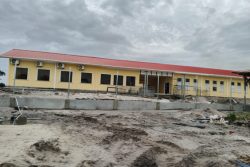Given the extreme and fast moving criminal violence between February 2002, when five dangerous prisoners made a bloody breakout from the Camp Street jail and August 2008, when the notorious Rondell Rawlins was killed, there are many gaps in the public’s understanding and knowledge of how the events developed, the masterminds and the players in the internecine warfare.
Most importantly, justice has been denied to hundreds of families and dozens of persons have escaped the consequences of their savage crimes.
Hardly had one gruesome exploit or brutal exponent exited the stage when others quickly took their place. The pace was frenetic, the body count mind-numbing and the human misery unbearable.
So when Mr Shawn Hinds delivered his dramatic declarations last week about death squads, killings and plots to HGP TV Channel 67 the Guyanese public would have been unpleasantly jolted back into this era of ghastly crime and insecurity. As unsettling as these declarations are they must be addressed. Since 2002, the public interest of the country has demanded that a full investigation of the criminality which brought the state and its security apparatus to the brink be carried out and that findings be used to enable justice for those left scarred and to guide security and other reforms. It is goes without saying, therefore, that what Mr Hinds has said and what else he really knows should be of great interest to the Ministry of Public Security and law enforcement agencies.
Had Mr Hinds uttered what he had to say under a PPP/C government, the public might have been less moved as it has been clear since 2002 that the PPP/C had no interest in wanting the public to know what transpired during this period of macabre violence. At every step of the way including the limited inquiry that it conducted into the death squad allegations made against former Home Affairs Minister Ronald Gajraj, the PPP/C’s sole motivation was to limit the information available lest it snare it and its senior officials in acts of acquiescence to extrajudicial killings and the co-opting of criminals into the crime fight etc. The elections of May 11, 2015 has changed the landscape. The parties in government while in opposition had railed repeatedly against the PPP/C’s governance during this period and had vowed that they would seek answers. Indeed, there were several attempts by way of motions in Parliament to elicit more information than had been available. A ball has now been lobbed into its court by Mr Hinds, it will be interesting to see how the APNU+AFC administration handles this.
Mr Hinds’ statements aren’t yet as important as the fact that he has shown himself willing to speak. For more than a decade Mr Hinds has been at the centre of many unsavoury criminal investigations denying many of the same things he has now claimed deep knowledge of. Clearly there will be great scepticism about what he has to say and doubts about the accuracy of the details several years on. His statements now need to be tested for real value. Already there are suggestions that his account of the killing of activist Ronald Waddell jars with sworn testimony in another jurisdiction and other statements. To be of any real assistance, Mr Hinds has to be prepared to submit himself to the authorities for gruelling questions and a painstaking piecing together of the events he claims knowledge of. In return the authorities would be expected to provide Mr Hinds with the safety of witness protection and determine whether, based on his sworn testimony, he is a suitable candidate for a plea deal.
Given that there are so many unanswered questions from the period 2002 to 2008 and so few persons prepared to admit involvement in that period much less prepared to testify, the APNU+AFC government can ill afford to appear disinterested in what Mr Hinds has to say. It must be proactive. It is in charge now. In other jurisdictions, Mr Hinds would have been taken immediately into custody and invited to give statements and swear to affidavits.
After hearing what Mr Hinds says the Granger administration may then be confronted with the necessity of convening a broad inquiry into the period from 2002 to 2008. It won’t be an easy task as there are many accusing questions to be answered and damning truths to be told. They start at the beginning and may even prove embarrassing to some in the current administration.
Was the 2002 prison break which triggered the virtual collapse of law and order planned by people on the outside with various motivations? How did the escapees thrive and avoid detection for so long? Where were they getting help from and why did some persons feel no qualms at all about helping them evade law enforcers? Was the theft of the 33 AK-47s from the Guyana Defence Force part of a sinister plot to aid them and further undermine the government? Who should have been held accountable for the loss of these weapons? Why were the joint police-army operations on the East Coast such a disastrous failure? Who inspired the murderous targeting of policemen and will the cop killers be brought to justice? What exactly did Roger Khan do during this period and where did his fiat come from? How many death squads were in operation and who were they taking orders from? Who were the so-called `freedom fighters’ and what were their objectives?
These are but a few of the questions that demand answers. First, however, the APNU+AFC government must show that it is keen for this opportunity to finely dissect the occurrences of that period and Mr Hinds must do more talking.
The opposition PPP/C should also be paying close attention to these developments and be prepared to address them. Its presumptive parliamentary leader, Mr Jagdeo was the President during this entire period and given the tight control he exhibited on all matters before him he will undoubtedly be called upon to explain what he knew.







